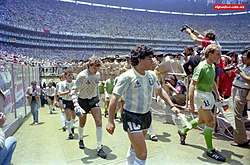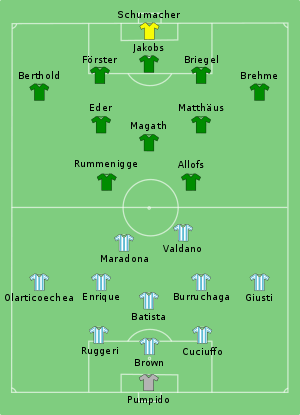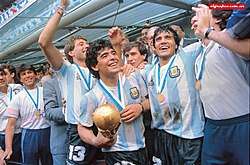1986 FIFA World Cup Final
The 1986 FIFA World Cup Final was the final and deciding game of the 1986 FIFA World Cup, held in Mexico. The match was held at the Estadio Azteca in Mexico City on 29 June 1986 and had an attendance of 114,600. It was contested by Argentina and West Germany. Argentina won the match 3–2 in normal time.[1][2]
 The teams enter the field at the Estadio Azteca | |||||||
| Event | 1986 FIFA World Cup | ||||||
|---|---|---|---|---|---|---|---|
| |||||||
| Date | 29 June 1986 | ||||||
| Venue | Estadio Azteca, Mexico City | ||||||
| Referee | Romualdo Arppi Filho (Brazil) | ||||||
| Attendance | 114,600 | ||||||
Route to the final
| Argentina | Round | West Germany | ||||||||||||||||||||||||||||||||||||||||||||||||||||||||||||||||||||||||||||||||||||||||||||
|---|---|---|---|---|---|---|---|---|---|---|---|---|---|---|---|---|---|---|---|---|---|---|---|---|---|---|---|---|---|---|---|---|---|---|---|---|---|---|---|---|---|---|---|---|---|---|---|---|---|---|---|---|---|---|---|---|---|---|---|---|---|---|---|---|---|---|---|---|---|---|---|---|---|---|---|---|---|---|---|---|---|---|---|---|---|---|---|---|---|---|---|---|---|---|
| Opponent | Result | First round | Opponent | Result | ||||||||||||||||||||||||||||||||||||||||||||||||||||||||||||||||||||||||||||||||||||||||||
| 3–1 | Match 1 | 1–1 | ||||||||||||||||||||||||||||||||||||||||||||||||||||||||||||||||||||||||||||||||||||||||||||
| 1–1 | Match 2 | 2–1 | ||||||||||||||||||||||||||||||||||||||||||||||||||||||||||||||||||||||||||||||||||||||||||||
| 2–0 | Match 3 | 0–2 | ||||||||||||||||||||||||||||||||||||||||||||||||||||||||||||||||||||||||||||||||||||||||||||
|
Final standing |
| ||||||||||||||||||||||||||||||||||||||||||||||||||||||||||||||||||||||||||||||||||||||||||||
| Opponent | Result | Knockout stage | Opponent | Result | ||||||||||||||||||||||||||||||||||||||||||||||||||||||||||||||||||||||||||||||||||||||||||
| 1–0 | Round of 16 | 1–0 | ||||||||||||||||||||||||||||||||||||||||||||||||||||||||||||||||||||||||||||||||||||||||||||
| 2–1 | Quarter-finals | 0–0 (aet) (4–1 pen.) | ||||||||||||||||||||||||||||||||||||||||||||||||||||||||||||||||||||||||||||||||||||||||||||
| 2–0 | Semifinals | 2–0 | ||||||||||||||||||||||||||||||||||||||||||||||||||||||||||||||||||||||||||||||||||||||||||||
Match
Summary

This was an exciting and memorable World Cup final. José Luis Brown opened the scoring for Argentina in the 23rd minute with a header after a free-kick from the right and it stayed at 1–0 until half-time. 10 minutes into the second half, Jorge Valdano doubled Argentina's lead with a low side foot finish after cutting in from the left past the advancing goalkeeper. Karl-Heinz Rummenigge pulled a goal back in the 74th minute from close range for West Germany, his first goal in the tournament. West Germany then equalised in the 83rd minute, with Rudi Völler scoring with a header from close range to seemingly salvage the game. Although Diego Maradona was heavily marked by Lothar Matthäus the entire game, his superb pass to Jorge Burruchaga in the 86th minute allowed Argentina to regain the lead at 3–2 when he slid the ball past the advancing goalkeeper from the right and into the corner of the net.[3][4]
Six yellow cards were issued in this match, which was a record number until the 2010 FIFA World Cup Final. Two of them were issued because of time wasting from Argentine players. As the clock expired, Argentina celebrated their second World Cup victory in three tournaments after having won the 1978 World Cup on home soil.
Details
| Argentina | 3–2 | |
|---|---|---|
| Brown Valdano Burruchaga |
Report | Rummenigge Völler |
Argentina
|
West Germany
|
|
 |
| |||||||||||||||||||||||||||||||||||||||||||||||||||||||||||||||||||||||||||||||||||||||||||||||||||||||||||||||||||||||||||||
|
Assistant referees:
|
Match rules:
|
Aftermath

The second World Cup won by Argentina is regarded by many as the most important victory for an Argentine side.[5] Four years after Argentina's victory over West Germany, both teams met again on the final of the subsequent World Cup, with West Germany winning the match 1–0 via a penalty kick. This marked the first time two World Cup finalists met twice, a record shared with Brazil and Italy, the latter two having met in the 1970 and 1994 World Cup finals. Argentina and Germany met again in the 2014 final for a record-breaking third time in which Germany won their fourth championship.
With the 1986 defeat, German manager Franz Beckenbauer (who had played in West Germany's defeat in 1966) gained the rather unwanted distinction of having lost a World Cup final as both a player and a manager. However, he led Germany to the said 1990 victory and became a winner of the World Cup as player and as manager, as he also won as the former in 1974.
The games are won by the players on the field, but behind it there must be a machinery that works. There I include players, coaching staff and leaders. If you throw all in the same direction, you can think of titles. That's what happened in Mexico '86.[6]
— Carlos Bilardo, manager of Argentina
References
| Wikimedia Commons has media related to Final of the 1986 FIFA World Cup. |
- 1986 Final on Planet World Cup
- 1986 FIFA World Cup Final Archived 13 April 2014 at the Wayback Machine on shubhayan.com
- En la cima del mundo by Pablo Ibaldi on Diario Publicable, 29 Jun 2016
- México 1986: Dios y diez más levantaron la segunda y última Copa by Federico Cristofanelli, Infobae, 30 Apr 2014
- Mundial ´86: a 30 años de la mayor hazaña del fútbol argentino by Augusto Dorado, 29 Jun 2016
- Argentina 86 on El Gráfico